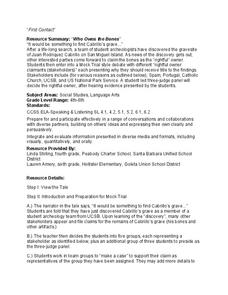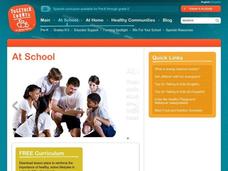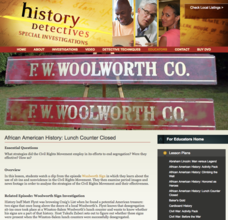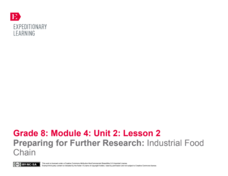Curated OER
It's Your Right: A Civil Rights Brochure
Learners examine the US Constitution, Bill of Rights, and Supreme Court cases in order to broaden their understanding of the US Judicial System. They research a variety of textual and Internet resources to create a tri-fold brochure,...
Channel Islands Film
Who Owns the Bones
A study of the history of the Channel Islands, located off the coast of southern California, continues as class members conduct a mock trial to determine which group of stakeholders should have the right to claim the remains of Juan...
Facebook
Different Perspectives
What do people's social media profiles say about them? Explore diverse perspectives and digital citizenship in an activity designed with self-identity in mind. Pupils reflect on their own profiles, then collaborate to examine...
Curated OER
What Was Columbus Thinking?
Why is Christopher Columbus one of the most studied figures in history? Upper graders will investigate why Christopher Columbus traveled to the New World and what happened to the native people he encountered. They read and discuss...
Curated OER
How Do Artists Effectively Relate Historic Events?
Students explore African American migration. In this black culture and history lesson, students use a map to identify northern and southern states in which African Americans lived in the 1900s. Students observe and describe objects and...
Curated OER
Is Mr. Wolf Really A Bad Guy?
Is the wolf from "The Three Little Pigs" really big and bad, or is he just misunderstood? To analyze the effect of point of view, middle schoolers read Jon Scieszka's The True Story of the Three Little Pigs and evaluate the information...
Curated OER
Fact vs. Opinion (Part II)
How can you tell the difference between fact and opinion? Using newspapers, learners determine which articles contain statements of fact, and which articles reflect the writer's opinion. The lesson plan includes a discussion format and a...
Curated OER
Worksheet 3.1 Functions
Middle and high schoolers complete and solve 12 various types of problems. First, they express the output as a function of the input in each table. Then, pupils evaluate for the given variable when the value is as stated. In addition,...
Curated OER
Analyzing the Language of Presidential Debates
Scholars assess how word choice and linguistic patterns affect a presidential debate. They examine candidates' words for repetition and analyze what this repetition means. Then they locate countries that fit the expression free world. In...
Curated OER
Alexander Hamilton and the Roots of Federalism
Explore the origin of political parties in the United States. Learners work in groups to read and analyze copies of the "Report on Manufactures" written by Alexander Hamilton. Then, they complete a worksheet comparing the Federalists to...
Curated OER
Written Document Analysis
For this primary source analysis worksheet, students examine types of written documents and respond to 6 analysis questions about them.
Curated OER
Cartoons in the Classroom: State Children's Health Insurance Program
This political cartoon may hit home for some budding analysts. They take a critical look at the issues and viewpoints surrounding the State Children's Health Insurance Program through a satirical lens. A great cartoon, amazing guiding...
Curated OER
Rapa River Watch
Assess the risk of introducing a non-native species of snail to four different estuaries. Lab groups conduct research as habitat evaluation and present their conclusions to the class. The resource has a comprehensive booklet containing...
Curated OER
Recognize Area as Additive - Matching Worksheet
Wow, that's a big pencil box! Scholars measure the area of a 15-foot pencil box among other measurement word problems. For each, they evaluate the information given to figure the area, which is sometimes not the end-all answer they are...
Curated OER
Your Energy Balance Goal!
This is the culminating activity for a unit on energy balance for 3rd-5th graders created by Together Counts. Young learners make a plan to balance their energy in and their energy out for one month. They use the SMART steps in creating...
Curated OER
The Customers
Exploring functions not represented by an expression is this task's secret. As your learners organize business customers in a database, they explore the definition of what it is to be a function.
Center for Civic Education
Becoming a Voter
What are the requirements to register to vote in the United States? Young citizens evaluate this process by working with handouts, informational texts, discussion, and research, as well as complete a sample voter registration form.
PBS
African American History: Lunch Counter Closed
Young historians investigate and evaluate the effectiveness of the strategies the Civil Rights Movement used to end segregation in the United States. After watching an video interview with Carl Matthews and Bill Stevens who participated...
Mr. Nussbaum
Abraham Lincoln Reading Comprehension—The Presidential Years (Part 3)
Abraham Lincoln abolished slavery and led the Union out of the most tumultuous time in American history. An informative passage and paired questions evaluate learners' understanding of main ideas, supporting points, and domain-specific...
EngageNY
Preparing for Further Research: Industrial Food Chain
Using an informative resource, pupils discover how to write research questions that are focused, answerable, and relevant. Scholars evaluate resources about the industrial food chain from Michael Pollan's The Omnivore's Dilemma and then...
News Literacy Project
News Goggles: Tracking Developing Stories
A 28-slide presentation introduces viewers to the process reports go through to track and verify developing news stories. Using the reports of the attacks at Atlanta, Georgia, massage parlors as an example, viewers are taught what to...
K20 LEARN
Unlocking Answers: Keys to Great Research
Successful searches for information require more than just a device with Google access. Young researchers learn how to use keywords and hashtags, as well as how to evaluate sources and how to paraphrase without plagiarizing in a fun...
K20 LEARN
Speak Up! Four Categories Of Speeches
High schoolers examine the four major types of speeches: informative, demonstrative, persuasive, and extemporaneous. Groups then select one type and craft and share a presentation highlighting this format's characteristics. Finally,...
Sharp School
The Bill of Rights and Supreme Court Cases Project
Social media and United States history combine as your young historians design a Facebook page for two major defendants of landmark Supreme Court cases. The resource includes a detailed rubric for research and page design, as well as a...

























